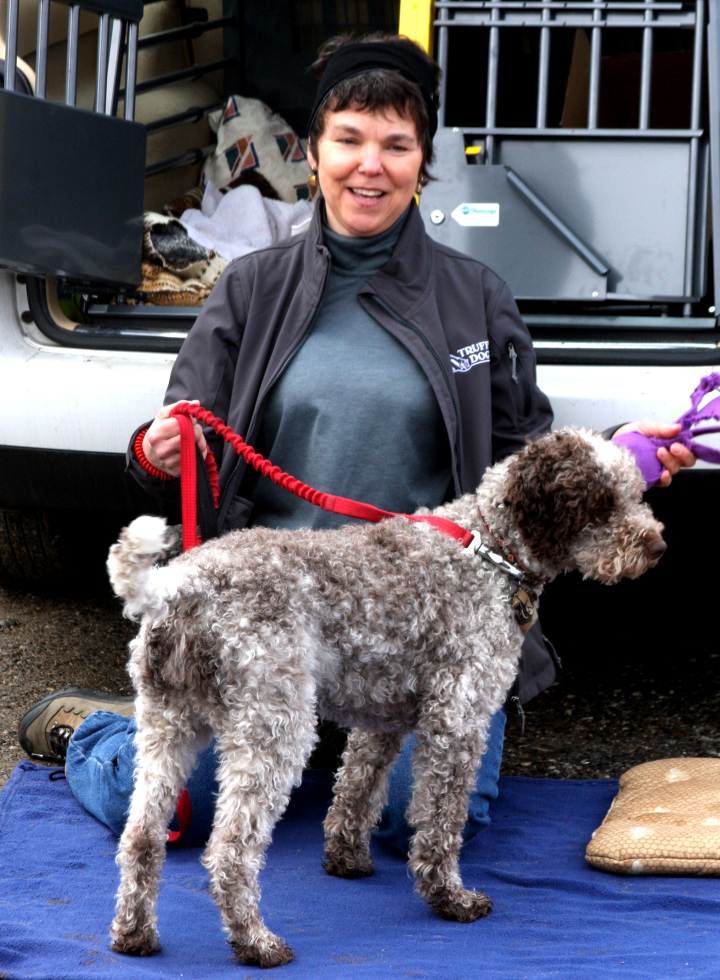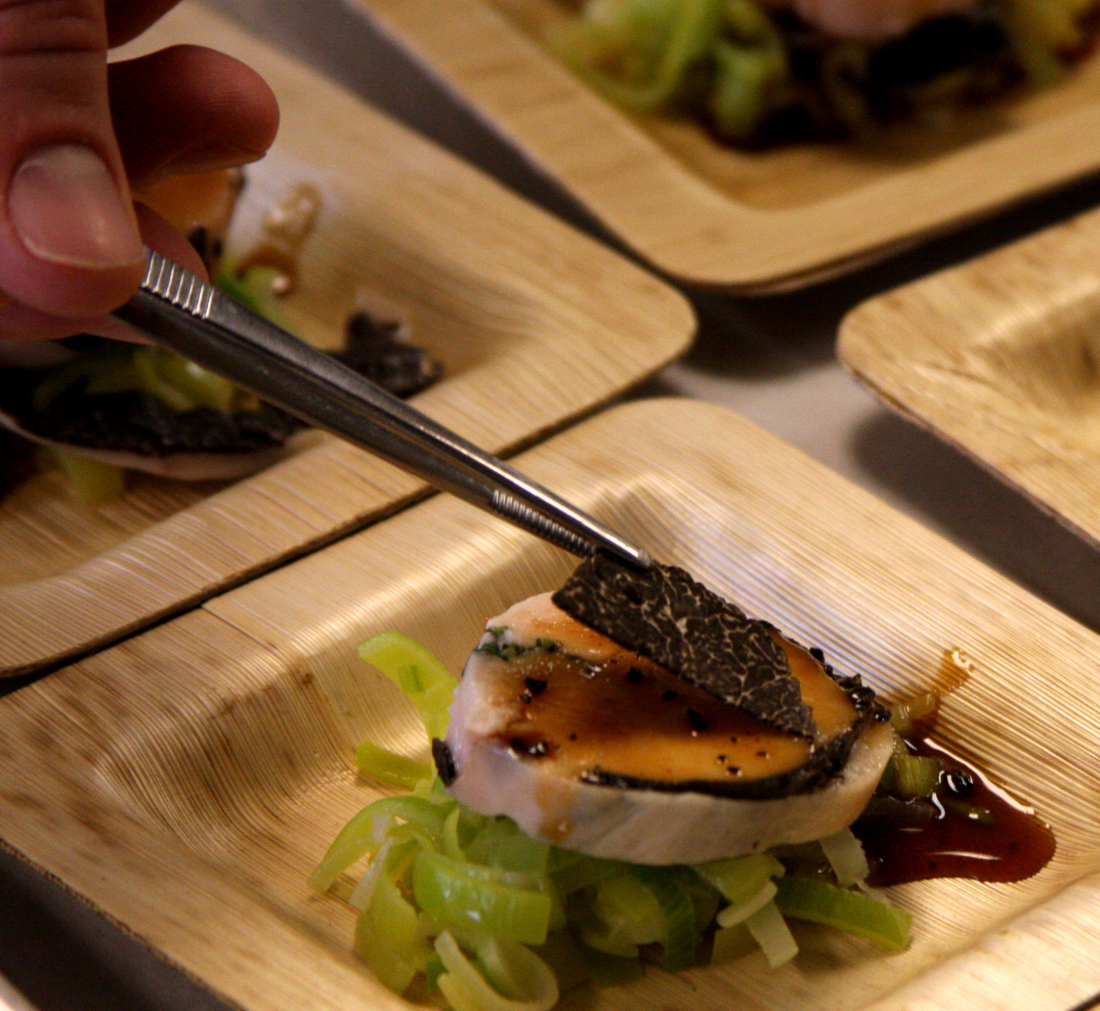Fifty years ago, the king of all crops in North Carolina was tobacco. Restaurants all had smoking sections or were entirely smoke-filled, and the standard fare was a working man’s meal.
How far we have come: Today’s diner has nothing to distract a sensitive nose from savory aromas wafting off the plate, except, perhaps, for a faint whiff of hops exuding from the cellar. And creeping into menus, suggesting the glamor of New York or Paris, is the truffle — a mysterious ingredient of gastronomic legend, revered by French and Italians, Greeks and Romans as the most prized of any element in the kitchen.
Musky, earthy, floral, pungent, fruity, feral, elusive, captivating — these are but a few ways to describe Tuber melanosporum. A sack of spores — the fruit of a fungus — the truffle makes its home underground in symbiosis with the roots of a host tree, generally oak or hazelnut. As a survival tactic that entices predators to aid in its quest for sexual reproduction, it emits a powerful odor when mature, and this is the aroma that causes chefs to swoon the world around.

In the health-conscious, field-to-fork-driven climate that is home to an ever-expanding cornucopia of chefs, Asheville is yet again on the leading edge. The third weekend of February, agronomists and gastronomists alike convened to celebrate their raison d’ être while brainstorming savvy ways of growing the longtime European specialty in our Appalachian and otherwise-American soils. In a series of samplings bordering on sensory overload, the Asheville Truffle Experience made strides to cement connections among scientists, growers, chefs and food lovers, with dog training thrown in the mix (the canine nose is well-suited to unearth a savory truffle, although pigs have been the traditional searchers).
The panel of experts included Pierre Sourzat, Jim Trappe and Tom Michaels, hailing from France, Oregon and Tennessee, each admitting that, while there is much that can be done to help create optimal conditions (raise the pH of the soil, water copiously in July and August, keep away both fungal and beastly predators), when it comes to growing truffles, we really don’t know much.
In the Southeast, we owe the beginning of this wild-card endeavor to Franklin Garland. Guatemalan of origin, adventurous of spirit, Garland began experimenting with coaxing the French Périgord truffle to life in the red clay soils of Hillsborough, N.C., in 1979, producing his first specimen in 1992. Twelve years later, Garland applied for a grant from the N.C. Tobacco Trust Fund to provide 50 ex-tobacco farmers with 200 inoculated trees apiece in an effort to turn the state into the Napa of truffles. As luck would have it, an exceptional drought swept the region in 2006 and 2007, and many of the plantations perished. Today, only a handful of these orchards are still tended.
On the other side of the Blue Ridge, Tom Michaels, whose Tennessee truffles have graced the tables of Daniel Boulud and Thomas Keller, among other chefs, planted his original orchard of 2,500 trees in 2000, near Jonesborough, Tenn. He’s fond of saying that the cultivation of truffles is “20 percent science and 80 percent art,” or more precisely, “1 percent mastery and 99 percent mystery.” Intuition and experimentation are all part of the gamble.
This makes most of the Asheville Truffle Experience attendees new pioneers on rocky terrain. Several of them belong to North American Truffle Growers’ Association, established in 2005 in an effort to help eliminate some of the trial and error — or “hit-or-mostly-miss,” as grower Paul Beckman of Idaho says — process of nurturing inoculated seedlings to truffle production. About 100 truffle farms have cropped up in the Southeast in the past decade; the growers meet twice yearly to compare notes and develop guidelines for quality control, forming a truffle-growing community that is rare in the business.
Besides Garland, a few other North Carolina growers of note are Jane Morgan Smith of Truffles NC and Keep Your Fork Farm in King; Jack Ponticelli of Piedmont Valley Truffles with a plantation of 15,000 trees in Yadkin and Surry counties; Patrick Fiorentino of Dobson, with a 5,000-tree orchard, dabbling in a molecular approach to growing; Susan Rice Alexander of the vast Black Diamond French Truffle plantation near Pinehurst; Scott Evans of Stoneville, who unearthed his first specimen just this January.
Closer to Asheville, the N.C. Department of Agriculture’s Mountain Research Station in Waynesville planted an experimental orchard with hazelnut trees in 2010 in an effort to provide tested information applicable to mountain farmers and agriculturalists across the state, while finding ways to expand the economy through research of new enterprises. The unearthing of a mature truffle becomes feasible within four to 10 years planting, which means the Mountain Research Station’s orchard could conceivably yield its first black diamond within the year.
Also, the Snelson family of Leicester planted a 1,200-tree orchard last June, inspiring three neighboring families to do the same. All of them are looking forward to seeing the income level in the area rise once orchards reach production — the going rate for a Périgord truffle is a far cry from the price of tobacco or any other traditional Appalachian or Piedmont crop. While the market fluctuates both yearly and seasonally, the average price falls somewhere between $800 and $2,000 a pound. In gastronomic restaurants around the world, just one grating of truffle on a dish can up the check by $100.
Given the picturesque package that truffle planting, producing, hunting and tasting present, its allure as agritourism is simple. Images of black-bereted Frenchmen with broad bellies and the accompanying porcine companion may well give way to visions of a plaid-shirted cowboy- or baseball-hatted mountain man or woman trailing a hound. However it may play out, and whether it ends up boosting the regional economy or simply providing colorful mouthwatering entertainment, the magic of the truffle has definitely taken root in WNC.
Susi Gott Séguret is founder and director of the Seasonal School of Culinary Arts in Asheville, Ithaca, N.Y., Sonoma, Calif., and Paris, and also orchestrates the Asheville Wine Experience and the Asheville Truffle Experience. See schoolofculinaryarts.org,ashevillewineexperience.com and ashevilletruffle.com.




Before you comment
The comments section is here to provide a platform for civil dialogue on the issues we face together as a local community. Xpress is committed to offering this platform for all voices, but when the tone of the discussion gets nasty or strays off topic, we believe many people choose not to participate. Xpress editors are determined to moderate comments to ensure a constructive interchange is maintained. All comments judged not to be in keeping with the spirit of civil discourse will be removed and repeat violators will be banned. See here for our terms of service. Thank you for being part of this effort to promote respectful discussion.